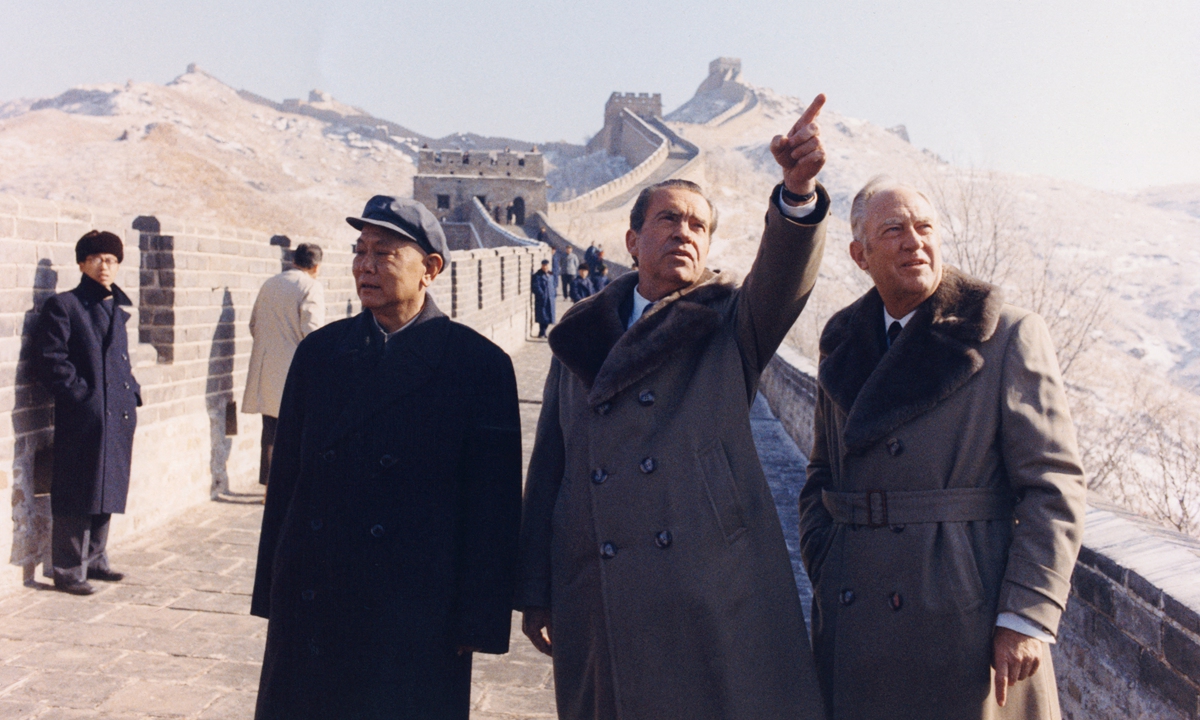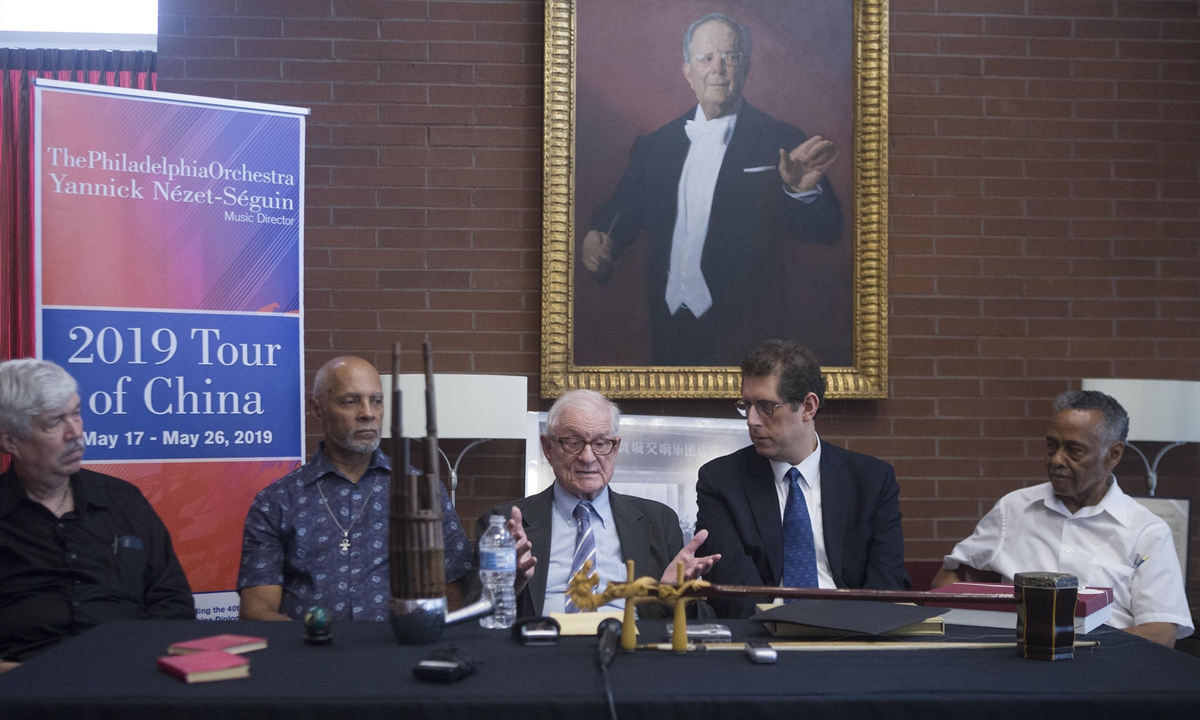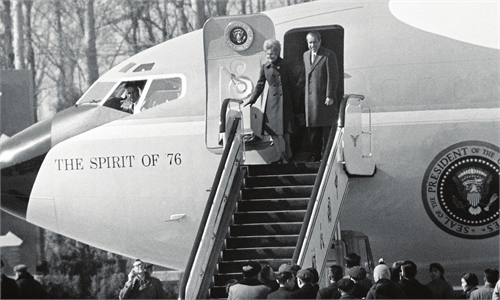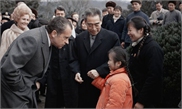Light that shone through from Nixon's big gamble 50 years ago has not faded: veteran diplomat
Ice-breaking journey

Former US President Richard Nixon (center) and formor US Secretary of State William Rogers (right) visit the Great Wall on February 24, 1972. Photo: AFP
On February 28, 50 years ago, on the night the Joint US-China Communiqué was issued, Nicholas Platt, one of the youngest diplomats in the US delegation who served as the special assistant to the then US secretary of state William Rogers, met President Nixon for the first and last time.
After the farewell evening banquet, where Nixon toasted the "week that changed the world," Platt, who began studying Chinese in the early 1960s, told Nixon that he had been preparing for the trip to China for 10 years, and thanked him for making it happen.
Fifty years later, at the age of 85, Platt still hasn't forgotten the scene and the great historical moment he witnessed that week.
"I felt as if I had been awarded an Olympic medal," in an exclusive interview with Global Times, Platt said how he felt when he was notified that he would be able to participate in that extraordinary trip 50 years ago.
"I was very proud to be a part of this journey of creation, at the beginning of the US-China relationship," Platt told the Global Times.
To make the trip go smoother, Platt did a great deal of preparation. "I prepared for the trip by arranging the preparation papers of the secretary of state Rogers. Those papers also, were put into President Nixon's book," Platt recalled.
After countless meetings on discussion and improvement, Platt's briefing was praised by Kissinger, who asked everyone to follow the briefing book prepared by the State Department to make the US delegation appear more united, wrote Platt in his 2009 book China Boys: How U S Relations with the PRC Began and Grew.
On February 21, 1972, with a mixture of apprehension and longing, Platt and the rest of the entourage, including the majority of the 87 journalists, landed in Beijing on two specially chartered Boeing 707s named "Ni Hao One" and "Ni Hao Two", which means hello in Chinese, ahead of the President's Air Force One.
After Nixon arrived, standing behind the left wing of President Nixon's aircraft, Platt found a good vantage point from which to take pictures of the "historic, and some felt endless, handshake" between Nixon and Premier Zhou Enlai.
Platt pointed out that Nixon was well aware of the importance of his trip, as former Secretary of State John Foster Dulles had arrogantly refused to shake hands with Zhou at the Geneva conference in 1954. When he arrived in Beijing, Nixon wanted the world, including China, to know that he was determined to correct the mistake. Nixon even required everyone else to wait in the cabin, walking down the spiral staircase only with first lady Pat in silence. Nixon believed that such an occasion needed a dramatic start, Platt noted.
However, after really getting down to work in China, Platt found that the US delegation was not operating as coherently as had previously been advised.
"Unfortunately, I did not meet Chairman Mao," said Platt, noting that at the time Rogers did not attend the meeting with Chairman Mao with Nixon and did not even know about it.
"I spent a lot of time trying to observe everything. Previously, I thought that there would be a lot more rhetoric about Communism and about differences in systems [between US and China]. And there wasn't. The Chinese were just as interested in getting to know us as we were interested in getting to know them," Platt said.
During those seven days, Platt visited the Forbidden City, the Great Wall, and other famous scenic spots in Beijing and Hangzhou, East China's Zhejiang Province.
Interestingly, Platt recalled that when he was taking in the magnificent view of the Great Wall, he saw turrets "fully manned by American correspondents and anchormen".
"I was very thrilled to be there." Platt said that for him, the sight of the world's media gathered at the Great Wall was the hallmark of their trip to China.
The trip to the Great Wall even led to a conversation with Premier Zhou that is still fresh in Platt's mind. At the dinner after visiting,Zhou consulted him about whether it would be appropriate to quote from a Mao poem: "He who has not been to the Great Wall is not a real man," in his toast to Nixon.
"Zhou, turned out to be very much a great facilitator. And he was extremely well-briefed; he even knew that I can speak Chinese, even though I was the most junior person on the American delegation," Platt said.
On February 27, 1972, when Platt accompanied Rogers to the Jinjiang Hotel in Shanghai, the birthplace of the Shanghai Communiqué, he was surprised by the sudden visit of Premier Zhou and his entourage of Ji Pengfei, then Chinese foreign minister, and interpreter, Tang Wensheng. Zhou's meeting with Rogers revolved around the achievements and impact of the US delegation's visit, and the two sides also expressed the desire to continue to deepen ties.
The meeting was "cordial," Platt said. "Since 1972 the US has worked its way into a clinch with China, and it should stay there," he noted.
The next day, after Platt expresses his gratitude, Nixon, who looked "drained but satisfied," accompanied Platt to the door,saying, "You China boys are going to have a lot more to do from now on."
Fourteen months after that meeting, Platt came to Beijing again, to "physically build the US Liaison Office." Picking up his China thread after having served as the US ambassador to Zambia, the Philippines, and Pakistan, Platt became president of the Asia Society in New York between 1992 and 2004, spending several years in Beijing and in Asia consolidating and improving the "nuts and bolts' he had negotiated with China in 1972.

In May 2019, Nicholas Platt (center) reminisces about past experiences with those who witnessed the Philadelphia Orchestra's first visit to China in 1973. Photo: VCG
Currently, looking back at the past 50 years, Platt believed that the light that shone through from the Nixon's big gamble has not faded."A lot has happened and a lot has changed in the 50 years. But we have to admit that there are too many relationships that Americans and Chinese have developed, which are still alive and worthwhile. The US-China relationship has gotten bigger and bigger, as a result, more and more important. Leadership in the US needs to understand the importance of the relationships," said the veteran diplomat.
Platt also noted that the Taiwan question was indeed a central disagreement between the US and China 50 years ago, and today, it continues to escalate tensions. "There's a lot of military action in the Taiwan Straits to test our feelings about the relationship, but I think our policy makers don't want anything that we do to lead to hostilities, so we have to deal with it with great care." he said.
Platt believed that a new generation of "China Boys" still exist.
"They have skill to repair it over time; they will," he said.



